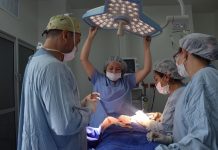 Women who decide to enlarge their cup size with the help of silicone implants put themselves at risk of developing a rare form of lymphoma – malignant tissue tumor. T-cell lymphoma may develop after breast augmentation in most cases. This lymphoma is characterized with rapid tumor growth and complicated treatment process. As a rule, this type of lymphoma is a very rare form and makes up three or less percent of total metastasis occurrences.
Women who decide to enlarge their cup size with the help of silicone implants put themselves at risk of developing a rare form of lymphoma – malignant tissue tumor. T-cell lymphoma may develop after breast augmentation in most cases. This lymphoma is characterized with rapid tumor growth and complicated treatment process. As a rule, this type of lymphoma is a very rare form and makes up three or less percent of total metastasis occurrences.
Authors of a study on this subject, scientists from Cancer Institute in Amsterdam, collected a national data base which contains all disease histories of people with any type of breast cancer diagnosed between 1990 and 2006. Oncologists proved that presence of breast implants increased the risk of developing T-cell lymphoma by 18 times. The doctors believe that silicone implants toxically damage the cells and also affect the immune system. Chronic autoimmune disorders in turn weaken the organism’s defence system, hence this way they contribute to the development of rather serious disease conditions.
Breast augmentation, which uses silicone as the implant, resulted in lengthy discussion in medical field ten years ago. Implants were removed from the market in 1992 as the scientists suspected that they may be causing cancer development or some other autoimmune disorders. Yet, US Food and Drug Administration cancelled the ban of commercial use of the implants which lasted for 14 years. The administration permitted two companies to use the implants in surgery conducted on women who are older than 22.










